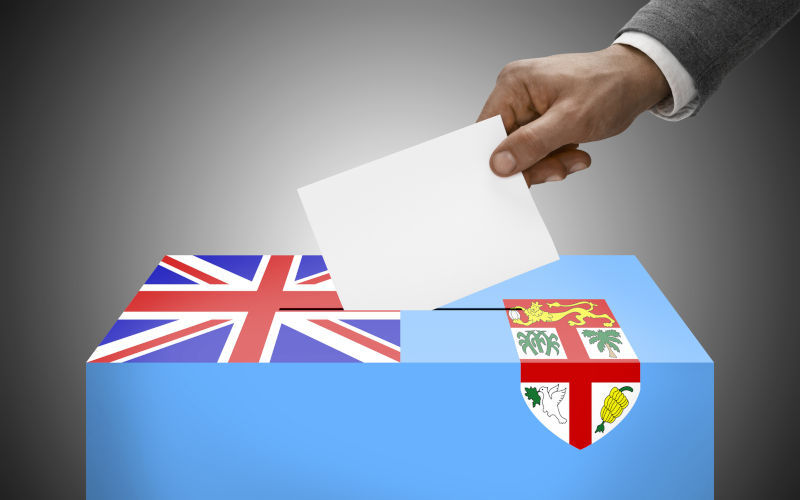In the shadow of the military: Fijis elections
December 20, 2022
Fiji has gone to the polls three times since 2006, when the country had what has been termed the coup to end all coups, sounding eerily reminiscent of wars that supposedly end all wars. History suggests that where one takes place, another will follow in good time.
Blotting the history book of Fijis elections is generous use of the coup dtat, the favoured choice of military forces fearing an advancement of ethnic Indian interests. In April 1987, the Fiji Labour Party and National Federation Party formed a coalition government containing a majority of ministers of Indian, rather than Melanesian origin.
Within a month, the government ceased to exist, courtesy of the exploits of Lieutenant-Colonel Sitiveni Rabuka. The all too familiar argument was cited: the rights of ethnic Fijians were threatened. A state of emergency was duly declared. In September that same year, an interim bipartisan government was formed, only to again be terminated in Rabukas second coup. It gave him the chance to make Fiji a republic, revoke the constitution and proclaim himself head of state.
This list of woes persisted, with the civilian government again overthrown in 2000 and 2006. In the latter case, the then head of the Fijian military Frank Bainimarama made himself prime minister, claiming that the government had been too lenient with the perpetrators of the previous coup.
In 2013, Bainimarama promulgated his own constitution in place of a suggested model drafted by international constitutional law scholar Yash Ghai. The problem with Ghais model, according to indignant senior military officers, was how it restricted military interference in politics by limiting it to the protection of the country from external threats at the request of the government.
The resulting Constitution of the Republic of Fiji naturally satisfied military interests, effectively ensconcing senior officers in the role of state custodians over and above those of the countrys parliamentarians. It shall be the overall responsibility of the Republic of Military Forces to ensure at all times the security, defence and wellbeing of Fiji and all Fijians.
The December 14 election saw a replay of old coup contenders, rifles laid down in favour of the ballot box. The main contenders were those old military hands: Prime Minister Bainimarama and Rabuka. Both had run against each other in 2018, with Rabuka being acquitted for electoral fraud just in time to make a failed bid to win office.
As a consequence, any close results on this occasion were always going to induce sharp intakes of breath, with Bainimaramas FijiFirst Party initially leading with 38.72% to Opposition leader Rabukas Peoples Alliance Party on 38.45%.
This narrow margin was not assisted by technical problems associated with the election offices app, which initially showed Rabuka ahead. After being restored after an initial period of inactivity, the app showed FijiFirst in the lead. Heads began shaking; suspicion started fomenting.
The opposition immediately scurried in the direction of the military. This was hardly in the spirit of democratic sensibility, but Fijis own constitution was itself an incitement to such a move. The Peoples Alliance, along with other opposition parties Sodelpa (Social Democratic Liberal Party), the National Federation Party, the Fiji Labour Party and Unity Fiji, also launched a petition on December 16 demanding an independent audit and recount in the presence of independent scrutineers and party representatives, declaring a lack of confidence in the election.
The co-chair of the Multinational Observer Group, Australian MP Rebekha Sharkie, expressed a different view: counting was taking place in a systematic, methodical and transparent manner. She had previously stated that over 90 observers from the MOG had been deployed to several hundred of the 1436 polling stations in all four of Fijis geographical divisions.
The Republic of Fiji Military Forces Commander Ro Jone Kalouniwai, on receiving the note of concern from Rabukas Peoples Alliance, told TV station FBC news that the military would refrain from meddling in the election process. In a separate interview with broadcaster RNZ Pacific, the commander also wished to reassure the people of Fiji that the RFMF (armed forces) will not respond to Rabukas insistence or any political party, that we intervene. Tensions were duly fanned by Rabukas questioning by police at the Criminal Investigation Division headquarters in Suva. No charges were laid, but a statement had been made.
Commander Kalouniwais judgment turned out to be wise. Bainimarama, the ascendant force in Fijian politics since 2007, lost his majority, despite netting 42.5% of the vote. Negotiations are now underway between Sodelpa, which won 9% of the vote, and both FijiFirst and the Peoples Alliance, which won 36%.
When asked why he was flirting with both options to form government, Sodelpas general secretary, Lenaitasi Duru, proved pragmatic, confident that change could still be achieved even in negotiating with FijiFirst. How Sodelpas non-negotiable priorities of free tertiary education and indigenous affairs will sit with the other major parties is not, as yet, clear.
The Peoples Alliance, however, ran on a platform of possible reforms to the 2013 Constitution, repealing all decrees that suppress basic human rights, promoting media freedom, freedom of expression and human rights more generally.
The issue of indigenous land rights remains ever exploitable. On occasion, it has led Bainimarama to warn of stabbing, murder and blood spilled on our land, and unlawful entering [of property] if that conversation is condoned. In all this, the long shadow of military guardianship remains.
Fiji is a case study showing that coups can be incitements for coups, with democracy remaining fragile and mutable. Former Prime Minister Laisenia Qarase, overthrown in 2006, gave a harsh assessment about this legacy. In any illegal overthrow the losers are the people of the country. It follows that the winners, at least under the current constitutional arrangements, will always be the military.

